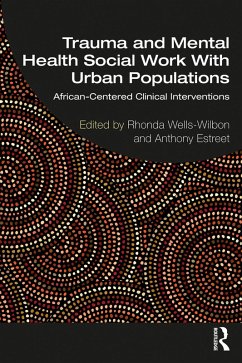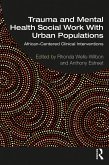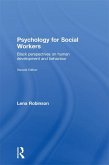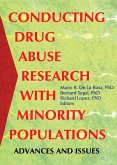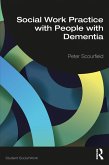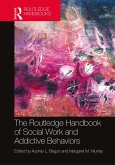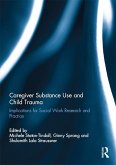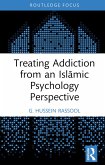Trauma and Mental Health Social Work With Urban Populations (eBook, ePUB)
African-Centered Clinical Interventions
Redaktion: Wells-Wilbon, Rhonda; Estreet, Anthony
38,95 €
38,95 €
inkl. MwSt.
Sofort per Download lieferbar

19 °P sammeln
38,95 €
Als Download kaufen

38,95 €
inkl. MwSt.
Sofort per Download lieferbar

19 °P sammeln
Jetzt verschenken
Alle Infos zum eBook verschenken
38,95 €
inkl. MwSt.
Sofort per Download lieferbar
Alle Infos zum eBook verschenken

19 °P sammeln
Trauma and Mental Health Social Work With Urban Populations (eBook, ePUB)
African-Centered Clinical Interventions
Redaktion: Wells-Wilbon, Rhonda; Estreet, Anthony
- Format: ePub
- Merkliste
- Auf die Merkliste
- Bewerten Bewerten
- Teilen
- Produkt teilen
- Produkterinnerung
- Produkterinnerung

Bitte loggen Sie sich zunächst in Ihr Kundenkonto ein oder registrieren Sie sich bei
bücher.de, um das eBook-Abo tolino select nutzen zu können.
Hier können Sie sich einloggen
Hier können Sie sich einloggen
Sie sind bereits eingeloggt. Klicken Sie auf 2. tolino select Abo, um fortzufahren.

Bitte loggen Sie sich zunächst in Ihr Kundenkonto ein oder registrieren Sie sich bei bücher.de, um das eBook-Abo tolino select nutzen zu können.
Addressing the social problems associated with trauma and mental health amongst African Americans in urban environments, this book uses an African-centered lens to critique the most common practice models and interventions currently employed by social workers in the field.
- Geräte: eReader
- mit Kopierschutz
- eBook Hilfe
Andere Kunden interessierten sich auch für
![Trauma and Mental Health Social Work With Urban Populations (eBook, PDF) Trauma and Mental Health Social Work With Urban Populations (eBook, PDF)]() Trauma and Mental Health Social Work With Urban Populations (eBook, PDF)38,95 €
Trauma and Mental Health Social Work With Urban Populations (eBook, PDF)38,95 €![Psychology for Social Workers (eBook, ePUB) Psychology for Social Workers (eBook, ePUB)]() Lena RobinsonPsychology for Social Workers (eBook, ePUB)37,95 €
Lena RobinsonPsychology for Social Workers (eBook, ePUB)37,95 €![Conducting Drug Abuse Research with Minority Populations (eBook, ePUB) Conducting Drug Abuse Research with Minority Populations (eBook, ePUB)]() Bernard SegalConducting Drug Abuse Research with Minority Populations (eBook, ePUB)21,95 €
Bernard SegalConducting Drug Abuse Research with Minority Populations (eBook, ePUB)21,95 €![Social Work Practice with People with Dementia (eBook, ePUB) Social Work Practice with People with Dementia (eBook, ePUB)]() Peter ScourfieldSocial Work Practice with People with Dementia (eBook, ePUB)38,95 €
Peter ScourfieldSocial Work Practice with People with Dementia (eBook, ePUB)38,95 €![The Routledge Handbook of Social Work and Addictive Behaviors (eBook, ePUB) The Routledge Handbook of Social Work and Addictive Behaviors (eBook, ePUB)]() The Routledge Handbook of Social Work and Addictive Behaviors (eBook, ePUB)45,95 €
The Routledge Handbook of Social Work and Addictive Behaviors (eBook, ePUB)45,95 €![Caregiver Substance Use and Child Trauma (eBook, ePUB) Caregiver Substance Use and Child Trauma (eBook, ePUB)]() Caregiver Substance Use and Child Trauma (eBook, ePUB)41,95 €
Caregiver Substance Use and Child Trauma (eBook, ePUB)41,95 €![Treating Addiction from an Islamic Psychology Perspective (eBook, ePUB) Treating Addiction from an Islamic Psychology Perspective (eBook, ePUB)]() G. Hussein RassoolTreating Addiction from an Islamic Psychology Perspective (eBook, ePUB)20,95 €
G. Hussein RassoolTreating Addiction from an Islamic Psychology Perspective (eBook, ePUB)20,95 €-
-
-
Addressing the social problems associated with trauma and mental health amongst African Americans in urban environments, this book uses an African-centered lens to critique the most common practice models and interventions currently employed by social workers in the field.
Dieser Download kann aus rechtlichen Gründen nur mit Rechnungsadresse in A, B, BG, CY, CZ, D, DK, EW, E, FIN, F, GR, HR, H, IRL, I, LT, L, LR, M, NL, PL, P, R, S, SLO, SK ausgeliefert werden.
Produktdetails
- Produktdetails
- Verlag: Taylor & Francis
- Seitenzahl: 244
- Erscheinungstermin: 30. Dezember 2021
- Englisch
- ISBN-13: 9781000525335
- Artikelnr.: 63023332
- Verlag: Taylor & Francis
- Seitenzahl: 244
- Erscheinungstermin: 30. Dezember 2021
- Englisch
- ISBN-13: 9781000525335
- Artikelnr.: 63023332
- Herstellerkennzeichnung Die Herstellerinformationen sind derzeit nicht verfügbar.
Rhonda Wells-Wilbon, DSW, LICSW, LCSW-C is a tenured Associate Professor and former Chair, Master of Social Work Program. She currently serves as a faculty member in the PhD Program, School of Social Work, Morgan State University, Baltimore, MD. She is Founder and CEO of Rhonda Wilbon Consulting LLC and Co-Founder of Empowered Wellness LLC. Her professional articles have appeared in several journals. Dr Wilbon has contributed to the professional literature with training curriculums, research reports, conference presentations, and book chapters. Her primary practice and research areas include domestic violence and adult survivors of child sexual abuse and sexual assault. Anthony Estreet, Ph.D., LICSW, is a tenured Associate Professor and Chair of the Addiction area of specialized practice in the Master of Social Work Program, School of Social Work, Morgan State University, Baltimore, MD. He is the CEO/Executive Director of a behavioral health consulting and treatment center - Next Step Treatment Center, LLC. Fueled by his strong desire to address health and mental health disparities through policy and practice efforts, he continues to develop key partnerships with various community-based organizations, hospitals, and universities across the United States and globally to provide ongoing training and technical assistance focused on improving behavioral health treatment-related outcomes.
Part 1: Introduction: Rethinking Trauma and Mental Health for People of
African Ancestry. 1. Reclaiming Our Right to Wholeness and Wellness. Part
2: Conceptualizing Urban Practice and Mental Health. 2. Living While Black:
The Psychophysiological Health Implications of Vicarious Racial Trauma. 3.
Sacred Spaces: Spirituality as a Healing-Centered Modality for Trauma in
Urban Communities. 4. Somatic Experiencing, EMDR, and Brainspotting: An
African-Centered Critique. 5. Culturally Relevant, Trauma-Responsive, and
Healing-Centered Social Work Supervision. Part 3: Trauma and the Legacy of
the Black Experience. 6. Encapsulating our Truths: An Afrocentric Approach
to Addressing Trauma in African American Culture. 7. Intimate Partner
Violence, Trauma and Mental Health. 8. #IAmMeToo: Considering
African-Centered Strategies for Sexual Assault Survivors. 9. The
Fingerprint of Trauma on Black Youth: A critical Analysis of Eurocentric
Social Work Models with Adolescents and the Shift Toward the Afrocentric
Paradigm. 10. Cocoa Butter: How Black Mothers Prevent, Protect and Heal
Their Daughters from Racialized-Gender Trauma. Part 4: In the Trenches:
Community Advocacy. 11. Being an Informal Caregiver:A Multigenerational
Issue Across The Life Span. 12. Addressing Trauma and Toxicity Among Black
Male Youth: Exploring African-Centered Rites of Passage Programming as a
Protective Factor. 13. Uponyaji: Restoring the Spirits Of Foster Care and
Adopted Children Who Have Experienced Loss. 14. Addressing Substance use
through African-Centered Practice Approaches. 15. Addressing HIV/AIDS in
the Black Community: Examining Culturally Responsive Approaches. 16.
Incarceration: The New Slavery.
African Ancestry. 1. Reclaiming Our Right to Wholeness and Wellness. Part
2: Conceptualizing Urban Practice and Mental Health. 2. Living While Black:
The Psychophysiological Health Implications of Vicarious Racial Trauma. 3.
Sacred Spaces: Spirituality as a Healing-Centered Modality for Trauma in
Urban Communities. 4. Somatic Experiencing, EMDR, and Brainspotting: An
African-Centered Critique. 5. Culturally Relevant, Trauma-Responsive, and
Healing-Centered Social Work Supervision. Part 3: Trauma and the Legacy of
the Black Experience. 6. Encapsulating our Truths: An Afrocentric Approach
to Addressing Trauma in African American Culture. 7. Intimate Partner
Violence, Trauma and Mental Health. 8. #IAmMeToo: Considering
African-Centered Strategies for Sexual Assault Survivors. 9. The
Fingerprint of Trauma on Black Youth: A critical Analysis of Eurocentric
Social Work Models with Adolescents and the Shift Toward the Afrocentric
Paradigm. 10. Cocoa Butter: How Black Mothers Prevent, Protect and Heal
Their Daughters from Racialized-Gender Trauma. Part 4: In the Trenches:
Community Advocacy. 11. Being an Informal Caregiver:A Multigenerational
Issue Across The Life Span. 12. Addressing Trauma and Toxicity Among Black
Male Youth: Exploring African-Centered Rites of Passage Programming as a
Protective Factor. 13. Uponyaji: Restoring the Spirits Of Foster Care and
Adopted Children Who Have Experienced Loss. 14. Addressing Substance use
through African-Centered Practice Approaches. 15. Addressing HIV/AIDS in
the Black Community: Examining Culturally Responsive Approaches. 16.
Incarceration: The New Slavery.
Part 1: Introduction: Rethinking Trauma and Mental Health for People of
African Ancestry. 1. Reclaiming Our Right to Wholeness and Wellness. Part
2: Conceptualizing Urban Practice and Mental Health. 2. Living While Black:
The Psychophysiological Health Implications of Vicarious Racial Trauma. 3.
Sacred Spaces: Spirituality as a Healing-Centered Modality for Trauma in
Urban Communities. 4. Somatic Experiencing, EMDR, and Brainspotting: An
African-Centered Critique. 5. Culturally Relevant, Trauma-Responsive, and
Healing-Centered Social Work Supervision. Part 3: Trauma and the Legacy of
the Black Experience. 6. Encapsulating our Truths: An Afrocentric Approach
to Addressing Trauma in African American Culture. 7. Intimate Partner
Violence, Trauma and Mental Health. 8. #IAmMeToo: Considering
African-Centered Strategies for Sexual Assault Survivors. 9. The
Fingerprint of Trauma on Black Youth: A critical Analysis of Eurocentric
Social Work Models with Adolescents and the Shift Toward the Afrocentric
Paradigm. 10. Cocoa Butter: How Black Mothers Prevent, Protect and Heal
Their Daughters from Racialized-Gender Trauma. Part 4: In the Trenches:
Community Advocacy. 11. Being an Informal Caregiver:A Multigenerational
Issue Across The Life Span. 12. Addressing Trauma and Toxicity Among Black
Male Youth: Exploring African-Centered Rites of Passage Programming as a
Protective Factor. 13. Uponyaji: Restoring the Spirits Of Foster Care and
Adopted Children Who Have Experienced Loss. 14. Addressing Substance use
through African-Centered Practice Approaches. 15. Addressing HIV/AIDS in
the Black Community: Examining Culturally Responsive Approaches. 16.
Incarceration: The New Slavery.
African Ancestry. 1. Reclaiming Our Right to Wholeness and Wellness. Part
2: Conceptualizing Urban Practice and Mental Health. 2. Living While Black:
The Psychophysiological Health Implications of Vicarious Racial Trauma. 3.
Sacred Spaces: Spirituality as a Healing-Centered Modality for Trauma in
Urban Communities. 4. Somatic Experiencing, EMDR, and Brainspotting: An
African-Centered Critique. 5. Culturally Relevant, Trauma-Responsive, and
Healing-Centered Social Work Supervision. Part 3: Trauma and the Legacy of
the Black Experience. 6. Encapsulating our Truths: An Afrocentric Approach
to Addressing Trauma in African American Culture. 7. Intimate Partner
Violence, Trauma and Mental Health. 8. #IAmMeToo: Considering
African-Centered Strategies for Sexual Assault Survivors. 9. The
Fingerprint of Trauma on Black Youth: A critical Analysis of Eurocentric
Social Work Models with Adolescents and the Shift Toward the Afrocentric
Paradigm. 10. Cocoa Butter: How Black Mothers Prevent, Protect and Heal
Their Daughters from Racialized-Gender Trauma. Part 4: In the Trenches:
Community Advocacy. 11. Being an Informal Caregiver:A Multigenerational
Issue Across The Life Span. 12. Addressing Trauma and Toxicity Among Black
Male Youth: Exploring African-Centered Rites of Passage Programming as a
Protective Factor. 13. Uponyaji: Restoring the Spirits Of Foster Care and
Adopted Children Who Have Experienced Loss. 14. Addressing Substance use
through African-Centered Practice Approaches. 15. Addressing HIV/AIDS in
the Black Community: Examining Culturally Responsive Approaches. 16.
Incarceration: The New Slavery.
